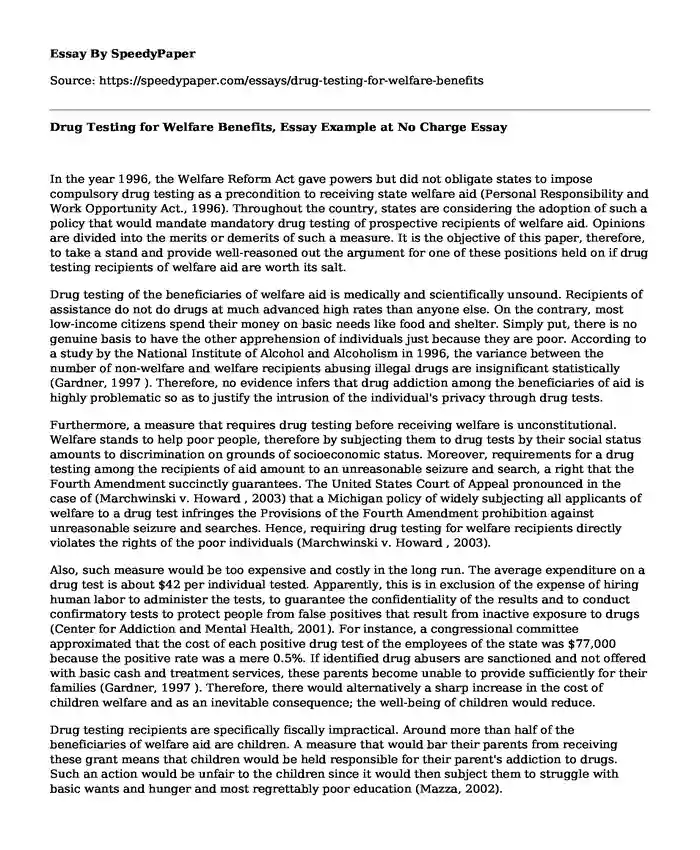
| Type of paper: | Essay |
| Categories: | Health and Social Care Government Society Drug |
| Pages: | 3 |
| Wordcount: | 761 words |
In the year 1996, the Welfare Reform Act gave powers but did not obligate states to impose compulsory drug testing as a precondition to receiving state welfare aid (Personal Responsibility and Work Opportunity Act., 1996). Throughout the country, states are considering the adoption of such a policy that would mandate mandatory drug testing of prospective recipients of welfare aid. Opinions are divided into the merits or demerits of such a measure. It is the objective of this paper, therefore, to take a stand and provide well-reasoned out the argument for one of these positions held on if drug testing recipients of welfare aid are worth its salt.
Drug testing of the beneficiaries of welfare aid is medically and scientifically unsound. Recipients of assistance do not do drugs at much advanced high rates than anyone else. On the contrary, most low-income citizens spend their money on basic needs like food and shelter. Simply put, there is no genuine basis to have the other apprehension of individuals just because they are poor. According to a study by the National Institute of Alcohol and Alcoholism in 1996, the variance between the number of non-welfare and welfare recipients abusing illegal drugs are insignificant statistically (Gardner, 1997 ). Therefore, no evidence infers that drug addiction among the beneficiaries of aid is highly problematic so as to justify the intrusion of the individual's privacy through drug tests.
Furthermore, a measure that requires drug testing before receiving welfare is unconstitutional. Welfare stands to help poor people, therefore by subjecting them to drug tests by their social status amounts to discrimination on grounds of socioeconomic status. Moreover, requirements for a drug testing among the recipients of aid amount to an unreasonable seizure and search, a right that the Fourth Amendment succinctly guarantees. The United States Court of Appeal pronounced in the case of (Marchwinski v. Howard , 2003) that a Michigan policy of widely subjecting all applicants of welfare to a drug test infringes the Provisions of the Fourth Amendment prohibition against unreasonable seizure and searches. Hence, requiring drug testing for welfare recipients directly violates the rights of the poor individuals (Marchwinski v. Howard , 2003).
Also, such measure would be too expensive and costly in the long run. The average expenditure on a drug test is about $42 per individual tested. Apparently, this is in exclusion of the expense of hiring human labor to administer the tests, to guarantee the confidentiality of the results and to conduct confirmatory tests to protect people from false positives that result from inactive exposure to drugs (Center for Addiction and Mental Health, 2001). For instance, a congressional committee approximated that the cost of each positive drug test of the employees of the state was $77,000 because the positive rate was a mere 0.5%. If identified drug abusers are sanctioned and not offered with basic cash and treatment services, these parents become unable to provide sufficiently for their families (Gardner, 1997 ). Therefore, there would alternatively a sharp increase in the cost of children welfare and as an inevitable consequence; the well-being of children would reduce.
Drug testing recipients are specifically fiscally impractical. Around more than half of the beneficiaries of welfare aid are children. A measure that would bar their parents from receiving these grant means that children would be held responsible for their parent's addiction to drugs. Such an action would be unfair to the children since it would then subject them to struggle with basic wants and hunger and most regrettably poor education (Mazza, 2002).
From the preceding, it is clear the costs of drug testing, out-weigh the benefits. Through drug testing, the state will spend excessive amounts to arresting a small number of drug users among family units that receive welfare aid to keep children souls and bodies together during the times of unemployment. Instead of this unconstitutional policy, states ought to adopt a broad-based program that offers drug treatment and substance abuse rehabilitation for all its citizens. Finally, funds that are channeled to the administration of drug tests can be reinvested in such programs or bumper the welfare kitty that has been on a fixed budget for too long now.
References
Center for Addiction and Mental Health. (2001, September). Retrieved April 30th, 2016, from <http://www.camh.net/journal/journalv4no2/forcing_welfare_drugtests.html>
Gardner, N. Y. (1997 ). In Implementing Welfare Reform: Solutions to the Substance Abuse Problem. (pp. 12-27). Chicago : Academic Chicago Inc .
Marchwinski v. Howard , 309 F. 3d 330 (6th Cir.2002) 00-2115 (The United Sates Court of Apeall. April 7th , 2003).
Personal Responsibility and Work Opportunity Act. . (1996). Retrieved April 30th , 2016 , from <http://www.usinfo.stategov/usa/infousa/laws/majorlaw/h3734_en.htm>
Cite this page
Drug Testing for Welfare Benefits, Essay Example at No Charge. (2019, Sep 10). Retrieved from https://speedypaper.com/essays/drug-testing-for-welfare-benefits
Request Removal
If you are the original author of this essay and no longer wish to have it published on the SpeedyPaper website, please click below to request its removal:
- The Mandala Tree of Life - Free Essay Example
- Free Essay the Impediments to Development of Sustainable Buildings in Jubal Industrial City
- Research Proposal Paper Sample: Chinese as Secondary Language Teaching
- Essay Example with a Reflection as a Nurse Facilitator
- Biography of Dame Iris Murdoch: British Novelist and Philosopher
- Free Essay: Clock Drawing Test (CDT) Assessment
- Free Essay Example on COVID-19 Impact on International Business: Scenarios Unveiled
Popular categories




